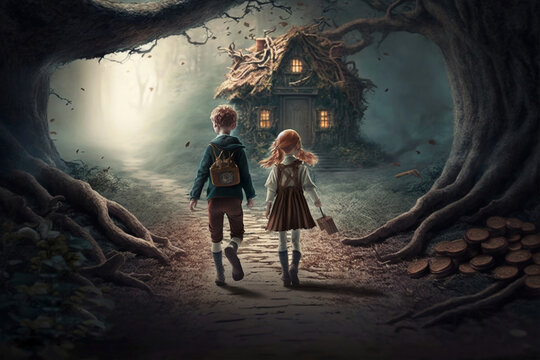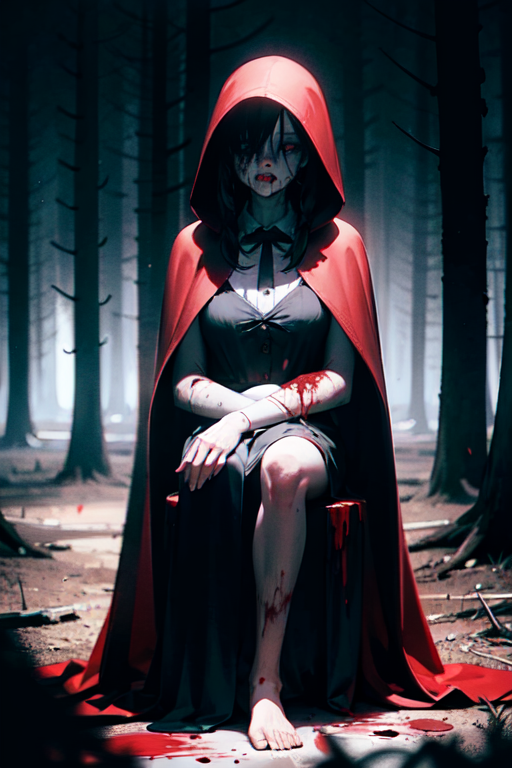Me: Rewrite the story of Snow White into a horror story with a scary ending
In a kingdom surrounded by dense, foreboding forests, there lived a queen obsessed with beauty. When her magic mirror informed her that her stepdaughter, Snow White, had grown to be the fairest of all, the queen's envy turned into a dark and twisted rage. She commanded her huntsman to lead Snow White into the heart of the woods and kill her, but the man, unable to go through with the deed, left her alone, warning her never to return. Snow White, terrified and lost, wandered deeper into the cursed woods, where the trees seemed to whisper and shift, their branches like gnarled hands reaching for her.
After hours of wandering, she came upon a small, decaying cottage. Inside, everything was in disrepair—rotting furniture, dust-covered surfaces, and strange, twisted carvings on the walls. Exhausted, she collapsed on one of the small, broken beds and fell into a troubled sleep. When she awoke, she found herself surrounded by seven grotesque figures, their eyes sunken, their skin pale and leathery. These were not the kind dwarfs of legend—they were twisted creatures, cursed long ago, doomed to feed on the life force of those who entered their domain.
Desperate and naive, Snow White pleaded for shelter, and the creatures allowed her to stay on one condition: she must never go down into the cellar. They warned her that something worse than death lived below. Though unsettled, Snow White agreed, and for a time, she helped them clean the house, though the shadows seemed to grow longer with each passing day, and the sound of soft scratching from beneath the floorboards haunted her nights.
Meanwhile, the wicked queen, discovering through her mirror that Snow White still lived, concocted a plan to destroy her once and for all. She disguised herself as an old peddler and made her way to the cursed cottage, bringing with her a blood-red apple laced with dark magic. When Snow White took a bite, the spell took hold immediately—her body collapsed, cold and lifeless, her heart slowing to a whisper of its former beat.
But death did not come for Snow White. Instead, she awoke in the cellar, where the darkness was alive, pulsating with a sickening presence. The creatures had dragged her down there, whispering that she now belonged to the house, to the thing that lived below. The cellar walls breathed, and the floor trembled with something enormous moving beneath. Snow White, unable to scream, felt its presence wrap around her, tendrils of shadow slithering over her skin, pulling her deeper into the void.
When the prince, hearing rumors of a beautiful maiden trapped in an enchanted sleep, arrived at the cottage, he found no sign of life. Inside, the air was thick with rot, and the strange carvings on the walls seemed to watch him. Venturing down into the cellar, he discovered Snow White, her once fair skin now a sickly gray, her eyes wide open but glassy and empty. As he knelt to kiss her, hoping to break the curse, her lips curled into a twisted smile. Her eyes flicked toward the darkness behind him, and from the shadows, the creatures emerged, dragging him screaming into the abyss.
Snow White rose from the cellar, no longer the innocent girl she had once been. Now, she was the bride of the darkness, bound to the cursed forest, her beauty forever tainted by the evil that had claimed her soul. The forest grew more dangerous with each passing year, the whispers in the trees growing louder, calling out to travelers, luring them to the cottage where Snow White and her creatures waited, ready to claim more victims. Those who ventured too close were never seen again, and the kingdom was soon plagued by tales of a cursed queen, beautiful and terrifying, who haunted the woods, waiting for anyone foolish enough to seek her out.






